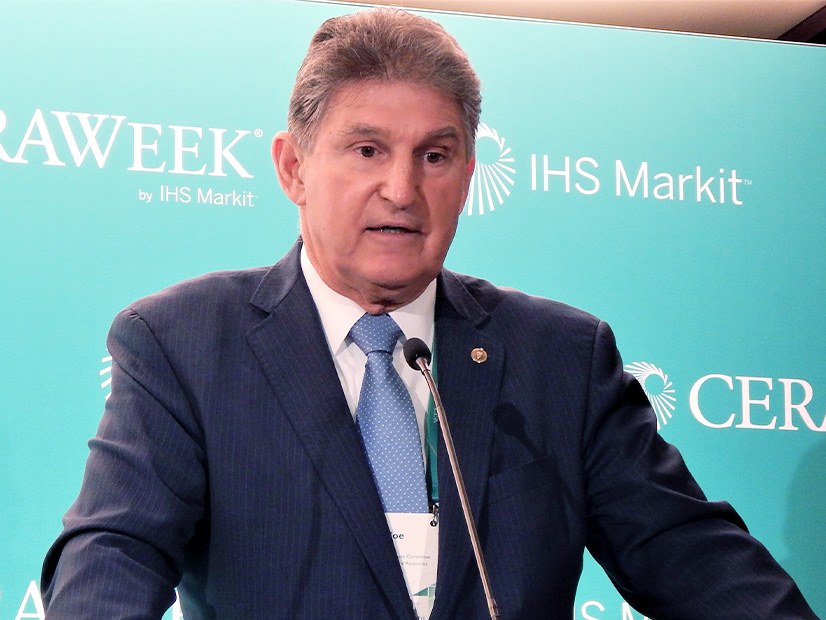Sen. Joe Manchin (D-W.Va.) released the revised text of his controversial permitting legislation Wednesday after congressional leaders refused to include it in a must-pass defense authorization bill.
Environmental groups and Democratic legislators celebrated news that the fiscal year 2023 National Defense Authorization Act (NDAA) would not include Manchin’s proposal, which would accelerate permitting of energy and mineral infrastructure projects.
“Thanks to the hard-fought persistence and vocal opposition of environmental justice communities all across the country, the #DirtyDeal has finally been laid to rest,” Rep. Raul Grijalva (D-Ariz.), chair of the House Natural Resources Committee, said in a statement Wednesday. “House Democrats can now close out the year having made historic progress on climate change without this ugly asterisk. Of course, we still have much more work to do to bring justice to those communities who are continuing to bear the brunt of climate change, but I’m at least glad we’re not taking a step backwards today.”
It was the second setback for Manchin, who withdrew an earlier version of the bill from a measure to fund the government in September. The legislation had angered both Republicans upset with Manchin’s vote for the Inflation Reduction Act and Democrats, who saw it as a concession to the oil and gas industry. (See Manchin Permitting Package Cut from Spending Bill.)
But Manchin, chairman of the Senate Energy and Natural Resources Committee, vowed Wednesday to offer the Building American Energy Security Act of 2022 as an amendment to the NDAA. The House is expected to consider the defense spending bill as soon as Thursday.
“Failing to pass the bipartisan, comprehensive energy permitting reform that our country desperately needs is not an acceptable option,” Manchin said. “As our energy security becomes more threatened every day, Americans are demanding Congress put politics aside and act on commonsense solutions to solve the issues facing us.”
The bill would guarantee permit approvals for the Mountain Valley Pipeline and give FERC enhanced electric transmission siting authority. Manchin said his proposal would accelerate permitting “without bypassing environmental laws or community input.”
But more than 750 environmental justice groups, environmental organizations and others urged House Speaker Nancy Pelosi (D-Calif.) and Senate Majority Leader Charles Schumer (D-N.Y.) in a letter Dec. 5 to reject the bill, saying it would “fast track fossil fuel infrastructure, restrict judicial review, and erode the National Environmental Policy Act (NEPA).”
2-Year Deadline
Manchin’s bill would set a two-year deadline for projects that require a full environmental impact statement and reviews from more than one federal agency and a one-year deadline for projects requiring an environmental assessment.
It also would reduce the time community members have to file legal challenges to 150 days. Manchin would require federal district and appeals courts to randomly assign judges for such challenges “to avoid the appearance of favoritism or bias.”
Project applicants would have the right to petition a court for an order requiring any agency that has missed a NEPA or final permit issuance deadline to make a decision within 90 days. It also would require courts to consider such petitions and other litigation of energy project permits on an expedited basis.
It would also seek to close loopholes to bypass deadlines and to reduce permitting workloads by setting page limits on environmental reviews.
The president would be required to designate 25 energy projects of “strategic national importance” for priority federal review, including projects for critical minerals, fossil fuels (including biofuel), non-fossil fuels (including storage), carbon capture, hydrogen and electric transmission.
Impact on FERC
Manchin’s bill would maintain the current FERC backstop authority over electric transmission, which gives states one year to issue, deny, or not act on a permit before the commission can issue a construction permit. It would eliminate the requirement that the Department of Energy make a finding that the project is in the national interest before FERC could act.
Eminent domain could be exercised on state land.
Manchin said the revised bill also amends cost allocation language to address concerns that FERC could otherwise consider direct jobs and property tax revenue when allocating cost of a project.
The Washington Post reported that Manchin’s refusal to schedule a confirmation hearing for FERC Chair Richard Glick, whom President Biden nominated for a second term, was undermining efforts to increase electric transmission. (See Glick’s FERC Tenure in Peril as Manchin Balks at Renomination Hearing.)
“Manchin holding up Glick’s reappointment seriously calls into question whether he even thinks the transmission provisions in the [permitting] bill are necessary or important,” Howard Crystal, legal director of the Center for Biological Diversity’s Energy Justice Program, told the Post. “Maybe the fossil fuel provisions in that bill are the things that Manchin really cares about.”
A White House spokeswoman said the administration continues “to hope our FERC nomination can move this year.”
Manchin would give FERC jurisdiction to regulate hydrogen under the Natural Gas Act, while ensuring that existing interstate hydrogen facilities would be grandfathered and permitted to continue operations. It would also clarify that FERC would not be given authority to require natural gas pipelines to be built or modified to also transport hydrogen. (See Lawyers, Industry Debate Path for Hydrogen Regulation.)
Adding the bill to the NDAA would likely require 60 votes in the Senate — an unlikely prospect with Senate Minority Leader Mitch McConnell (R-Ky.) dismissing the bill as “permitting reform in name only.”
“Potential defections by between six and eight Senate Democrats could leave a gap that outstrips GOP support, especially if Republicans view House control next year as leverage for deeper reform,” said ClearView Energy Partners.




